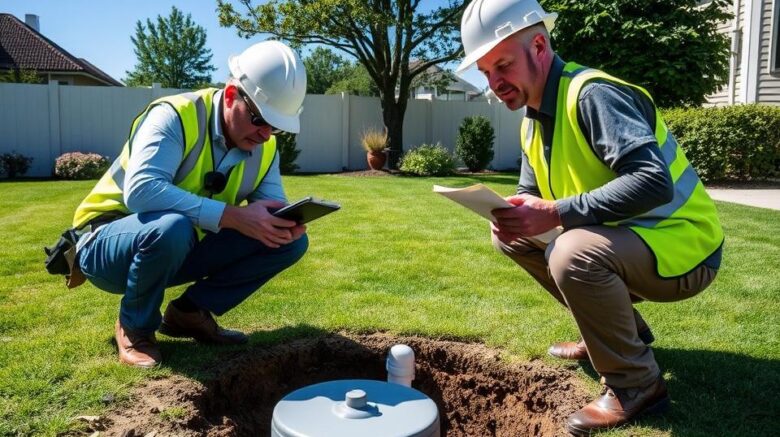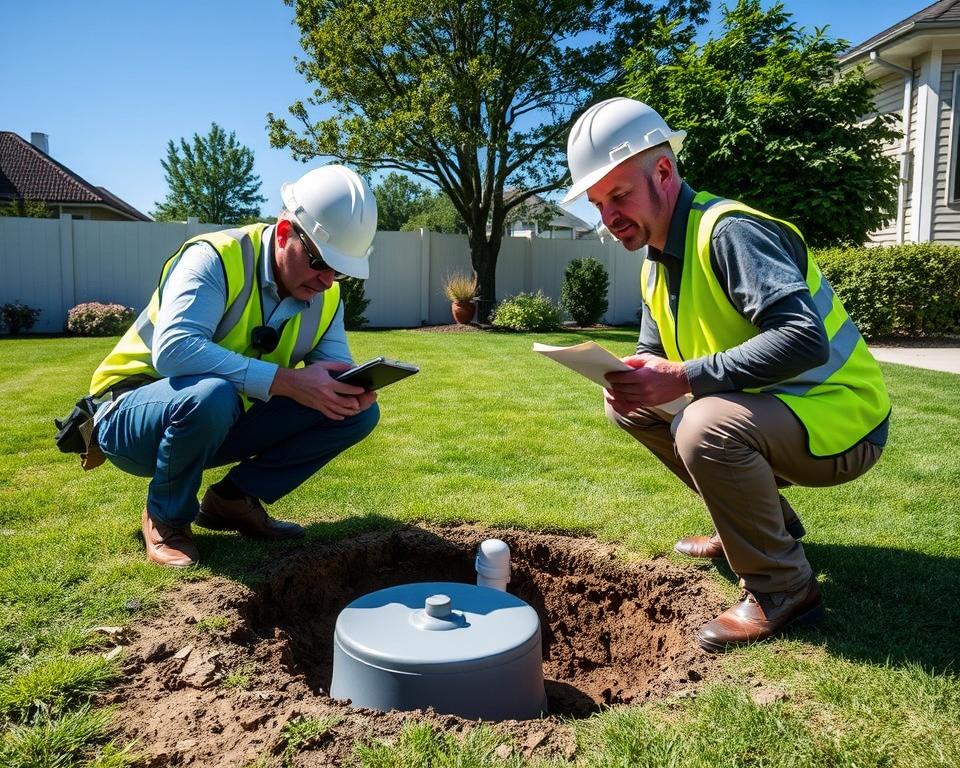Septic System Inspection: Guarantee Your Security
Did you ever reflect on the significance of your septic system and the risks of its failure? Nowadays, where efficient sewage management is essential, septic system inspections are indispensable. They spot issues at an early stage, avoiding health hazards and expensive repairs. Particularly in rural locales, homeowners need to make these assessments a top priority for property safety and environmental cleanliness.
Summary Points
- Routine septic system inspections are crucial for avoiding costly repairs.
- Septic tank analysis can detect problems early, safeguarding health and environment.
- A qualified septic inspection entails thorough examinations by certified inspectors.
- Grasping your septic system can improve its longevity and performance.
- Failing to inspect can lead to serious health risks and property damage.
Grasping the Importance of Septic Systems
Septic systems are integral for managing household wastewater, especially where there’s no municipal sewage link. They manage on-site wastewater treatment, maintaining harmful pollutants at bay. This procedure is key for environmental safety.
Regular maintenance and checks are necessary for septic systems to safeguard community health effectively. A system in good condition avoids wastewater leaks. These leaks can contaminate water sources, posing to drinking water and community health at risk.
There’s a direct link between a well-managed septic system and environmental protection. Effective operation of these systems is key to minimizing pollution and fostering sustainable lifestyles with septic tank cleaning.
What Happens During a Septic System Inspection
The septic system inspection includes important steps to check its functionality and safety. Experts from All in Sanitation conduct a thorough review, focusing on several parts of the system. They seek to ensure everything is in excellent order.
During the inspection, technicians examine the septic tank, looking for any leaks or pipe issues. They measure the septic tank’s liquid levels to guarantee optimal performance. This comprehensive check halts problems from escalating, sidestepping contamination and failure.
Grasping these essential steps enables homeowners to maintain their septic systems effectively. By catching issues early through a proper inspection, the system’s life can be considerably extended. This shields against potential risks.
Essential Components Checked in a Septic System Inspection
A full septic system inspection examines vital components to ensure its effective functioning. The initial focus is on the septic tank, a central element of the system. Inspectors review the tank’s condition, searching for wear or damage signs. They look over the tank walls, inlet and outlet pipes, and check for any blockages.
Inspectors also assess the drain field, crucial for filtering effluent back into the groundwater. They look for standing water or odd vegetation pointing to issues. The distribution box’s flow and distribution are checked to confirm consistency across drain lines.
The septic baffle’s health is another significant check. Technicians ascertain that the baffles are intact and function properly, stopping sludge from reaching the drain field. They also measure sludge and scum levels to ensure they are within safe limits.
The inspection’s final step is verifying the system’s watertight integrity. Inspectors check that the tank’s liquid level is normal, stopping any potential leaks or overflows. This comprehensive check helps identify minor problems before they become large-scale repairs, thus protecting the septic system’s health.
| Component | Focus of Inspection | Significance |
|---|---|---|
| Septic Tank | Condition of walls, pipes, and obstructions | Critical for waste collection |
| Drain Field | Standing water, vegetation anomalies | Guarantees proper effluent filtration |
| Distribution Box | Flow and distribution checks | Maintains balanced drainage |
| Baffles | Integrity and function | Prevents sludge migration |
| Liquid Level | Verification of normal range | Prevents leaks and contamination |
Frequent Troubles Detected in a Septic System Inspection
In septic system inspections, experts often detect numerous problems that degrade system efficiency. Foremost are overfilled tanks, usually due to too much water use or unnoticed leaks. This condition prevents the system from processing wastewater correctly, leading to backups and further issues.
Damage or malfunction in pipes is another usual issue found. Such faults impede wastewater flow and can lead to costly fixes if neglected. Blocked filters also pose significant problems, lowering system performance and creating environmental risks.
Neglected servicing aggravates these septic problems. Through regular checks, such issues can be identified and fixed early. This preventive approach rescues homeowners from steep repair costs and secures community health.
Time Required for a Septic System Inspection
A standard septic inspection lasts from two to 4 hours. Factors like property size and septic complexity influence this duration. Should surprise problems arise or bad weather hinder access, inspection times may extend. Preparing in advance with these timeframes in mind lets homeowners to arrange smartly for a detailed check.
It’s wise for homeowners to attend the inspection. It permits them to seek clarifications and understand the inspector’s observations firsthand. Scheduling the visit for a time when full attention can be given enhances the experience and final result.
| Inspection Factor | Time Range |
|---|---|
| Basic inspection | 2 – 3 |
| Complex system | 3 – 4 |
| Unforeseen issues | 4+ |
Frequency of Septic System Inspections
Regular septic inspections are vital to maintain your system’s longevity and performance. It’s widely recommended for homeowners to have their septic system inspected every 3 years. This frequency may be adjusted depending on factors like the size of your household, the volume of daily water use, and the system’s age.
Larger families or homes utilizing garbage disposals might need inspections sooner. Keeping up with the right maintenance schedule is critical. It helps catch potential problems early and secures your system operates efficiently.
Here’s a helpful table outlining factors that might alter your inspection frequency:
| Factor | Suggested Interval |
|---|---|
| Standard Household (2-3 people) | Every 3 years |
| Larger Household (4+ people) | Every 1-2 years |
| Home with Garbage Disposal | Every 1-2 years |
| Older Septic System | Annually |
Following a regular septic maintenance plan offers peace of mind. It forestalls hefty repairs and keeps your household safe and sanitary.
Consequences of Neglecting Regular Septic System Inspections
Not scheduling routine septic inspections increases the risk of system failures. Early-stage issues can spiral into larger ones, necessitating expensive repairs. Wastewater backups from these failures threaten homes and the environment, risking groundwater contamination.
Unaddressed septic issues expose people and pets to harmful bacteria and diseases. Homeowners could sidestep hefty expenses with scheduled inspections. Ignoring routine maintenance can inflate a small problem into a larger crisis, disrupting your daily life and causing stress.
The financial burden of replacing an entire septic system can be overwhelming. Homeowners shoulder the full cost. However, regular inspections allow early problem detection, thwarting issues from worsening. Consistent upkeep not only lengthens the system’s life but also saves homeowners from potential financial and environmental disasters.
Homeowner Tips: Maintaining Your Septic System
For homeowners, septic system care is essential for its longevity and function. Applying proper maintenance tips guarantees smooth operation and reduces repair costs. Simple steps can greatly enhance septic tank performance.
Reducing water use in the home is important. Small changes like fixing drips and choosing efficient fixtures ease strain on the system. Households should be mindful of their water consumption.
Appropriate trash disposal is essential. Do not flush items such as wipes, period products, and grease – they damage the system’s balance. Dispose of such materials properly, using rubbish bins or compost.
Avoiding harsh chemicals is also vital. Household cleaners can damage the beneficial bacteria in your septic tank. Opt for eco-friendly cleaning products to protect this crucial ecosystem.
Regular checks on the drain field area are vital for proper functioning. Watch for saturated soil or standing water, signs of possible problems. These issues need quick action.
| Action | Rationale |
|---|---|
| Conserve water | Prevents system overload |
| Properly dispose of waste | Maintains balance of the tank |
| Limit harsh chemicals | Protects beneficial bacteria |
| Inspect drain field | Identifies potential problems early |
Embracing these septic system maintenance strategies will maintain your septic care at its best. This secures a functional, enduring system for the future.
Hiring Professional Inspectors
Choosing professional septic inspection services is crucial for homeowners. Companies like All in Sanitation supply detailed septic system evaluations. Their experienced experts ensure no important issue goes unnoticed.
These professional septic inspectors employ state-of-the-art methods to find problems. This capability is key for ensuring your septic system’s longevity and your property’s health. They educate homeowners on how to keep your system functioning well.
Benefits of Working with a Certified Septic Inspector
Working with a certified septic inspector delivers key benefits for homeowners. These inspectors have deep knowledge of local regulations and industry norms. Their expertise secures comprehensive, accurate inspections, reducing the risk of missing key issues.
These experts have the skills to detect a wider spectrum of potential issues. Due to their advanced training, certified inspectors can recognize subtle signs of deterioration or failure. This ability guarantees problems are tackled early, cutting homeowners significant costs and preventing severe problems later.
Another important benefit is the peace of mind they provide to homeowners. Knowing a qualified professional is evaluating their system builds confidence. This certainty about the inspection’s quality provides extra security, supporting the system’s reliability.
In summary, the positives of enlisting a certified expert for septic inspection clearly surpass any cost involved. These benefits include pinpoint accuracy, early detection of potential problems, and a strong sense of security among homeowners about their septic systems.
Conclusion
Routine septic inspections are imperative for homeowners who wish to prevent costly repairs. These checks go beyond mere routine. They highlight the critical role of maintenance in keeping septic systems operating smoothly.
Working with certified experts, such as All in Sanitation, empowers homeowners to sustain the efficacy of their septic systems. This forward-thinking strategy does more than just defend property value. It also bolsters community well-being and environmental health.
Taking timely measures on septic inspections safeguards your investment. It guarantees your home remains a safe and inviting haven for your loved ones.

